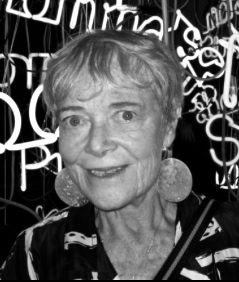 Vera Isler-Leiner, bom 1931 in Berlin, died in Basel in 2015, was a German-Swiss photo artist and object-maker. Her parents were murdered in Belzec in 1942. She spent her youth between 1938 and 1949 under miserable circumstances in an orphanage in Switzerland. In second marriage she was married to Manuel Isler, a Swiss literary scholar and journalist.
Vera Isler-Leiner, bom 1931 in Berlin, died in Basel in 2015, was a German-Swiss photo artist and object-maker. Her parents were murdered in Belzec in 1942. She spent her youth between 1938 and 1949 under miserable circumstances in an orphanage in Switzerland. In second marriage she was married to Manuel Isler, a Swiss literary scholar and journalist.
In the 1950s, she initially worked as a scientific assistent at the Swiss National Science Foundation. In addition, she began to work as actress for movies and as TV moderator. After an exciting time of experimenting, she started to work as a visual artist. She had created objects in different materials. As a result, her work was presented at various exhibitions. 1963/1968 she emerged textile works, i.a. Traum-Zeiten, 1968/1978 she devoted herself to reliefs and objects, in the period 1978/1984 she created with lead scriptures the project Chromosomes – the DNA story. The cities of Basel and Zürich commissioned her with large textile wall installation (Zurich), a concrete relief for the city swimming hall (Basel) and a wall fresco for the city sports hall (Basel).
Relatively late she moved to photography, which became her obsession. At first she got well known with serials about people over eighty and her photographies about the US homosexual scene.
But Vera Isler’s main work body became portrait photos, which differ from any other artist’s photograph quite fundamentally by their monumentality and their directness. She did not photograph in the studio – she went to the artists, met them in their studios, talked to them at exhibitions, and captured distinctive, personal moments and encounters – in life-size b/w prints. Regarding her concept photographer and artist, the presented person and the viewer, met in a tightly arranged arrangement on the same level, so that the visitor can “meet” the person in the photograph. During a first longer US-stay, 1980 in New York, Los Angeles, and San Francisco, she limited herself to photography focused on faces. Later she traveled Europe, Siberia, Japan, China and Australia. From 1981 onwards her activities related to photo portraits of art, artists and artistic architecture. Her works have been published in magazines, and various photographs have been created with a focus on portrait photography. At the heart of her work there is always the human beeing. In 1986, her photo book Schaut uns an, portraits of people older than than 80-years, attracted and provocated. At the beginning of the 1990s, she met Heinz-Günter Mebusch at the documenta in Kassel and was directly fascinated by his photographical concept. She started Face to Face and Kunsttäter with portraits of famous artists and friends to prolongue the series of Mebusch in her own way. Since 2000, artistic video films and video stills have been created. In the video Bits + Pieces, produced in 2003, she filmed the once-infamous sex mile on 42nd Street in New York, which was cleaned by order of the former mayor, Rudolph Giuliani. With her camera, she captured the changes in the street life and encountered a creative microcosm of street actions and performances that she contrasted with media and advertising everyday scenes. From this video work she created after 2003 with minimal blur independent large-scale works (i.a. Transfusion, 2008).
Vera Isler-Leiner participated in talkshows, gave interviews on radio and television, and gave readings from her book Auch Ich, where she had reflected her breast cancer and her survival. The work of Vera Isler-Leiner has been supervised and managed by the non-profit organization Artforum Culture Foundation. Her work is exhibited and collected by Museum Tinguely, Museum der Moderne Rupertinum Salzburg, Historisches Archiv City of Cologne, Artforum Artspace, Artforum collection, Kunstmuseum Witherhur, Fotostiftung Switzerland, Museum der Kulturen Basel, Winter Foundation Hamburg, Christoph Merian Foundation Basel, Swiss Confederation Federal Office of Culture Bern, Musée de la Photographie Elysée Lausanne, Vienna Kunsthalle, and many Swiss, European and US private and corporate collections.
LINKS:
